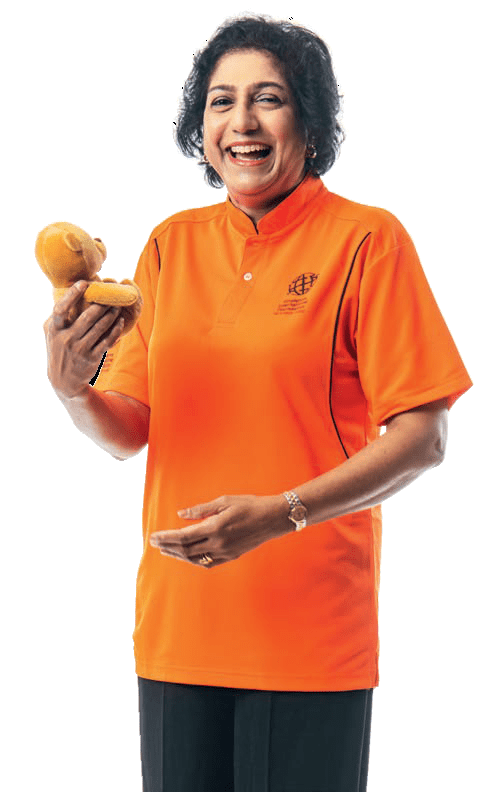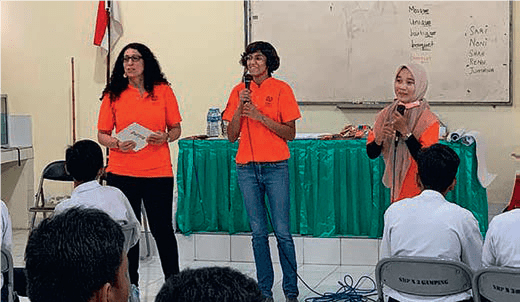Stories > Child’s Play
Child’s Play
Singaporean educator Dr Nirmala Karuppiah is helping to raise the standard of early childhood education across Asia.
BY ALYWIN CHEW

Dr Karuppiah’s aim was to help Indian teachers adapt the Singapore learnings to their own local context.
vidence that a good start is fundamental to the development of practically anything in life is ubiquitous. In the context of education worldwide, research has shown that early childhood education (ECE) centred on the holistic development of a child’s physical and mental faculties can create a positive effect that cascades on for decades to come. Moreover, says Dr Nirmala Karuppiah, high-quality ECE is crucial because it levels the playing field.
“The impact of good ECE is the most pronounced in children who come from low-income families,” says Dr Karuppiah, who is currently the Head of Education at the Centre for Research in Child Development at the National Institute of Education.
This cognisance of how empowering ECE can be compelled her to become a Singapore International Foundation (SIF) volunteer who has provided ECE training to teachers in the Indian cities of Kolkata and Mumbai. The five-year project, which commenced in 2017, was undertaken in partnership with the non-profit Muktangan Education Trust. It saw a group of Singapore ECE educators equip their Indian counterparts with skills in areas that included curriculum enhancement, pedagogy and teacher development. To ensure sustainable impact, a group of core local trainers were also identified to train aspiring teachers in the sector.
STRONG FUNDAMENTALS
Dr Karuppiah is no stranger to international volunteerism. During her first stint with the SIF in Ullon Village outside of Kolkata 18 years ago, the lack of resources needed to support a child’s development quickly came to light. Unlike the more developed regions that have dedicated teaching facilities, the preschools in this village were set within marketplaces.
Although the facilities she witnessed in Mumbai were better equipped, most of the local educators had only generic teaching experience and lacked the fundamental knowledge of ECE, which was still in its nascent stages.
“The ECE sector in Mumbai back then was like what Singapore was before 2000, when there wasn’t yet a national ECE curriculum,” she shares.

Dr Nirmala Karuppiah helped her Indian counterparts enhance their skills in the ECE sector in areas such as pedagogy, curriculum development and teacher’s training.
A TWO-WAY RELATIONSHIP
The SIF volunteers also faced the challenge of having to win the trust of the locals, who were skeptical of what their foreign counterparts were there to teach. “We had to spend a lot of time gaining their trust and respect. We ensured that this initiative was not a one-way street, but an exchange between two parties,” she says.
“The goal was not to teach the Indian educators to adopt our practices — it was about helping them learn the Singapore model so that they could localise the programmes that were more suited to the Mumbai context.”
In fact, Dr Karuppiah walked away with poignant lessons of her own. For example, her experience of having to create makeshift teaching aids taught her to be more resourceful.
“In Singapore, it is easy to procure the materials we need for classes. That is a good thing, but the flip side is that we tend to lack creativity,” she explains. “But in India, many teachers have to do things from scratch. As a result, they become more resourceful and creative.”
These takeaways, she adds, show just how important it is for ECE educators around the world to communicate with one another and share best practices — because it is only through such exchanges that they gain access to new insights that would not have been available within their own countries.
“Singapore is tiny while India is vast. But the very rich learning that your very small country has for us is something that we need to absorb, and we are grateful to Singapore for this.”
Sudeenhra Kulkarni, chairman, Observer Research Foundation, Mumbai
This sentiment is echoed by Sudeenhra Kulkarni, chairman of the Observer Research Foundation in Mumbai, who appreciates the work done by committed educators in the ECE sector.
“The SIF has been doing commendable work in transmitting an understanding about the positive impact of good ECE. Singapore is tiny while India is vast. But the very rich learning that your very small country has for us is something that we need to absorb, and we are grateful to Singapore for this,” he said in his concluding remarks at the SIF’s ECE leaders’ dialogue held in Mumbai previously.
STRIKING A BALANCE
Dr Karuppiah also gleaned several lessons from her observations of Indian society and culture. For instance, she posits that Singaporeans can learn from how Indians deal with problems.
“In Singapore, I find that we often get too caught up with having to be accountable for everything and ensuring everything is standardised that we become immobilised in times of chaos. In India, the locals are so used to chaos that they can think on their feet and find solutions to problems,” she explains.
“These days, I often remind my teachers that things do not always go as planned, and that they need to be more flexible.”
Another major difference between the two societies is how they view the future. She describes Singaporeans as planners who tend to think too far ahead, whereas the Indians are generally more focused on the present.
Both approaches, she clarifies, have their merits and pitfalls. As such, neither can be considered the “better” option. Rather, the key is finding a balance between the two.
In the context of ECE, she explains that one of the challenges ECE practitioners face today is convincing parents that play is just as, if not more, important as academic skills.
“The truth is that academic skills can be picked up when the children go to primary school, but the opportunities for play and holistic development happen in the early years,” she says.

Renu Chandra Segaran (centre), Dr Karuppiah’s daughter, follows in her mother’s footsteps by volunteering at the SIF’s Words on Wheels programme in Yogyakarta, Indonesia.
IMPACTING THE NEXT GENERATION
As it turns out, Dr Karuppiah’s efforts have helped shape the minds of not only the young children in India — even her daughter has been influenced. Inspired by how her mother’s teaching stints could transcend boundaries, her daughter, Renu Chandra Segaran, signed up for the SIF’s Words on Wheels programme in Yogyakarta in 2019, providing English lessons to children in small towns. The programme also involved providing access to books and the Internet via a mobile library.
“Unlike my mother, I’m not a teacher. Nevertheless, I do believe that what you learn or experience at a young age has implications on your views and interactions with society later on in life. One of the reasons I enjoy science till today was the nurturing environment I had as a child both at home and at school,” she says.
“Perhaps not everyone in this world is so lucky to have all the resources to learn comfortably. Through platforms such as the SIF, we can bring together the people who have the expertise as well as some resources to nurture those who are equally deserving to learn.”
|
CITIZEN AMBASSADOR The work of the Singapore International Foundation (SIF) is not possible without the support of many Singaporeans who generously give of their time and talent as volunteers. Their collective efforts bring us closer to becoming a nation of responsible global citizens. Singaporeans play the role of Citizen Ambassadors (CA) when they volunteer to work alongside their overseas counterparts to shape new realities, while fostering greater intercultural understanding. A CA is a friend of the world – someone who recognises that Singapore sits within the global community and that there is a need for greater understanding and collaboration between countries in order to build a better, more peaceful and inclusive world. As key enablers of our work, all our CAs abide by the SIF Global Citizens Charter, which sets out the principles, values and behaviours expected of them, based on the SIF’s mission and core values. 
Scan here to find
|
